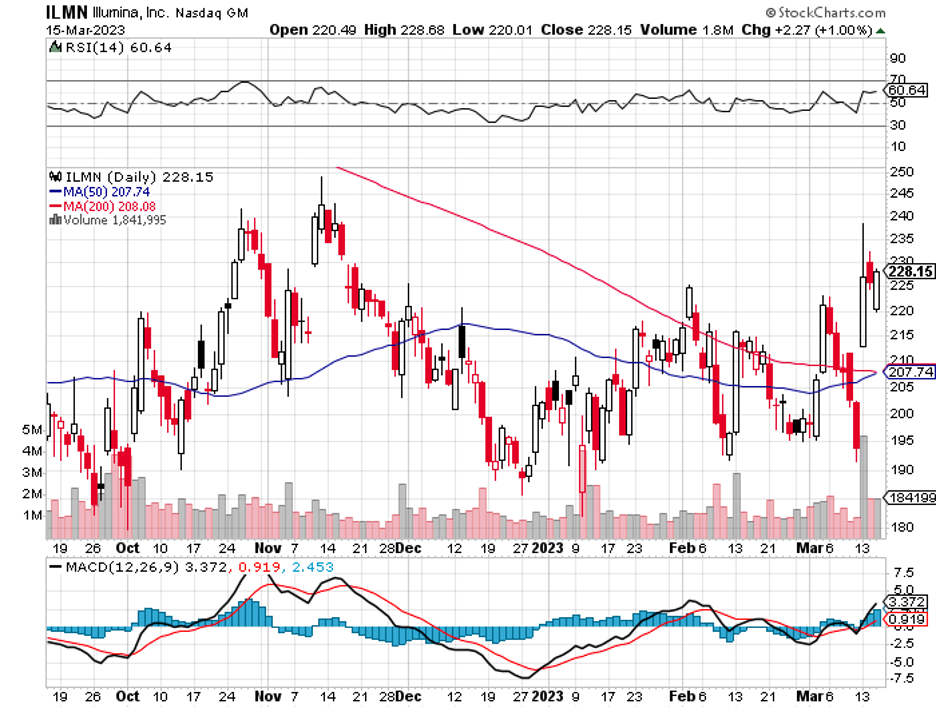Who's Really the Boss
Carl Icahn—the legendary investor known for toppling corporate behemoths and taking charge of their destinies—has swooped in to save Illumina (ILMN) from its own misguided move.
To salvage what’s left of the promising biotechnology company, he has emerged with a plan for shareholders: halt their recent deal with Grail—a cancer-screening firm that Icahn and his faithful followers want nothing more than to see dropped. Part of his plan is to nominate three people to sit on the board of Illumina. The move sent shares of ILMN soaring – no doubt leaving Icahn feeling pretty victorious himself.
For additional background, Icahn isn’t an ordinary businessman and investor. He is the founder, chairman, and majority shareholder of Icahn Enterprises, a diversified conglomerate holding company based in New York City, formerly American Real Estate Partners. He is one of the world's most successful and influential investors, having made billions through his investments in companies such as Apple (AAPL), Time Warner Inc. (TWX), RJR Nabisco (now Mondelez (MDLZ)), and Texaco (CVX). His extensive corporate takeover activities have resulted in him being dubbed "The King of Corporate Raiders."
As an activist investor, he is an individual or a member of a group of investors who uses their financial resources to directly influence the actions and decisions of organizations, often by purchasing shares in the business.
They often demand changes to corporate structure and strategy changes, board composition, and executive compensation practices. Needless to say, activist investors have a significant impact on a company, as they typically target companies that are undervalued and push for changes that can increase their value.
This is an extremely timely announcement for Illumina since the company’s value plummeted from $70 billion in 2021 to $31 billion in 2023. However, the biotech isn’t going down without a fight.
The acquisition of Grail by Illumina was first announced in September 2020, and it has been a subject of discussion and scrutiny since then. The proposed deal involves Illumina buying out the remaining stake in Grail that it does not already own, for a total of $8 billion in cash and stock.
Illumina believes that its plan to acquire Grail is a significant development in the field of genomics and cancer diagnostics. At the moment, Illumina is a leading provider of genomics technology, while Grail is a biotechnology company focused on developing a blood test for early cancer detection.
The acquisition is expected to create significant synergies between the two companies. Illumina's expertise in genomic sequencing technology combined with Grail's cutting-edge liquid biopsy technology could potentially lead to the development of a powerful and efficient cancer detection tool.
The acquisition has, however, faced some challenges, including regulatory hurdles. The Federal Trade Commission (FTC) expressed concerns that the acquisition could lead to Illumina having a monopoly in the market for sequencing machines, which are used in Grail's liquid biopsy tests. As a result, the FTC filed a lawsuit to block the acquisition.
Despite the challenges, Illumina and Grail remain committed to the deal, and in December 2021, they announced that they had reached a settlement with the FTC. The settlement requires Illumina to sell its existing liquid biopsy technology to a third party and abide by certain conditions to prevent any potential anti-competitive effects of the acquisition.
All things considered, it is undeniable that the acquisition of Grail by Illumina has the potential to revolutionize cancer diagnostics and improve patient outcomes. However, the regulatory hurdles demonstrate the importance of ensuring mergers and acquisitions do not harm competition and ultimately negatively impact consumers.
Overall, Illumina is a promising biotech with much room to grow. It pioneered the development of next-generation sequencing (NGS) technology, which revolutionized the field of genomics. NGS allows researchers to sequence large amounts of DNA quickly and at a lower cost than traditional Sanger sequencing methods.
NGS works by breaking the DNA into small fragments and sequencing them simultaneously. These short reads of DNA are then assembled to create a whole genome. Illumina's NGS technology is based on a proprietary sequencing-by-synthesis method, which uses flourescently labeled nucleotides to detect and record the sequence of DNA bases as they are incorporated into a growing DNA chain.
NGS has many applications in genomics research, including identifying genetic mutations, studying gene expression patterns, and characterizing the microbiome. The technology has also played a critical role in advancing precision medicine and personalized healthcare.
Illumina's pioneering work in NGS has allowed the company to establish a dominant market position in the genomics industry and has driven significant innovation in the field of genomics.
Thanks to this biotech’s products, the cost of a complete human genome analysis dropped from the hundreds of millions range in 2001 to less than $1000 today. More notably, the company projects the price to go lower and be below $200 when it releases its new services.
Being hailed as a market leader is a well-deserved description for the company. After all, Illumina quadrupled its revenues in the past 10 years and continues to deliver decent results.
Icahn’s move to take on Illumina offers a fresh and seemingly more promising perspective regarding the company’s direction. He believes Illumina can unlock value by spinning off non-core businesses, returning cash to shareholders, reducing costs, and improving operational efficiency. However, Illumina's management resisted Icahn's calls for a sale and instead focused on investing in research and development to drive growth.
Still, Icahn's targeting of Illumina is likely driven by his belief that the company is undervalued and not maximizing shareholder value. While it will take time before anything gets resolved, what’s apparent is that Illumina doesn’t hold complete freedom when it comes to decision-making, which would inevitably hurt its future success.


